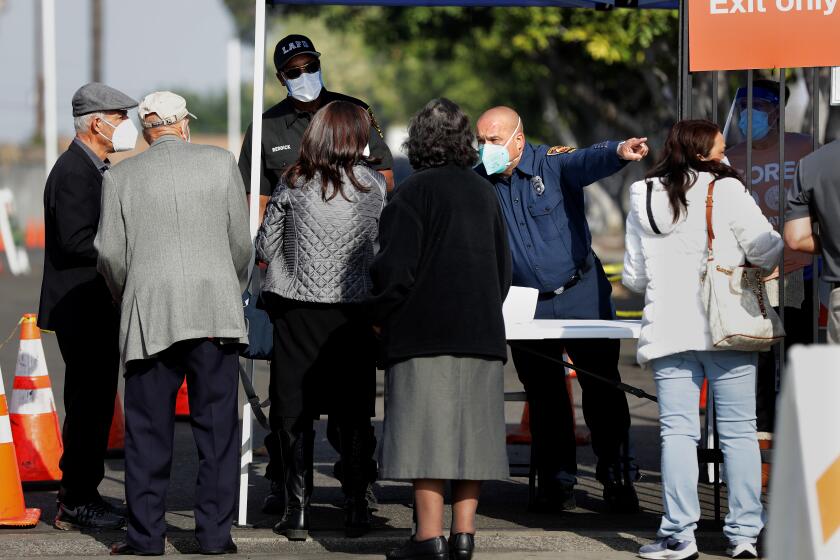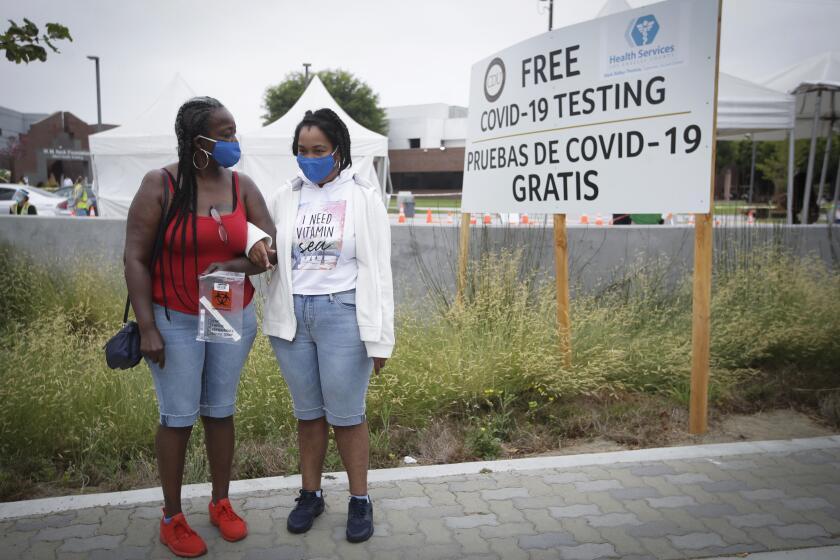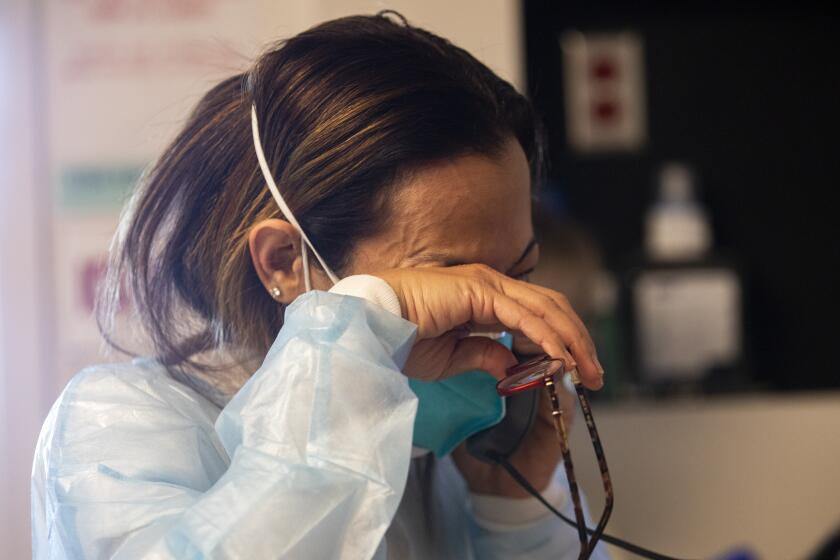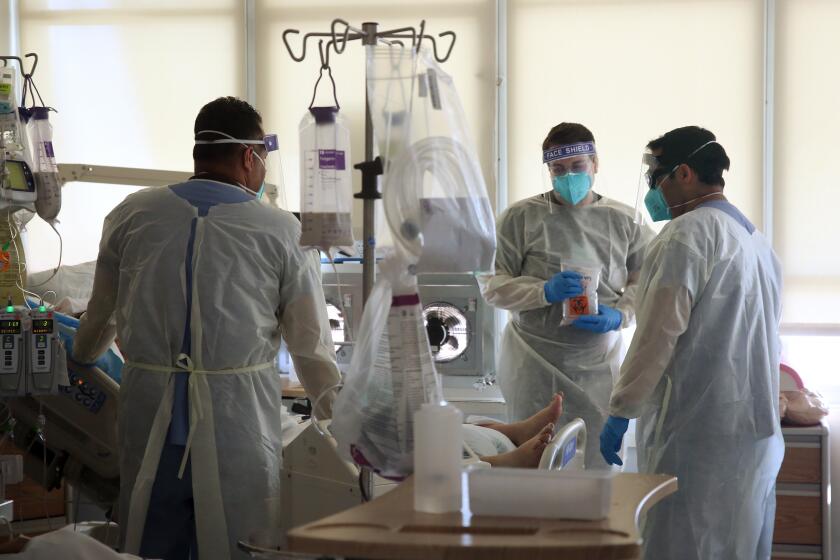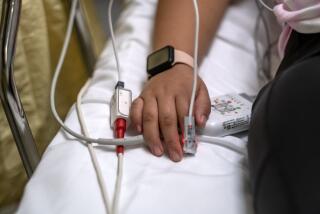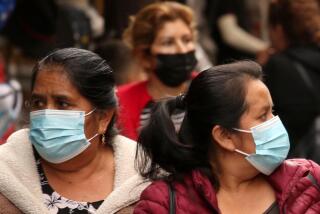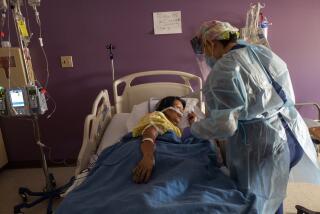Overwhelmed by COVID-19, hospitals âmaking difficult decisionsâ as patient care deteriorates
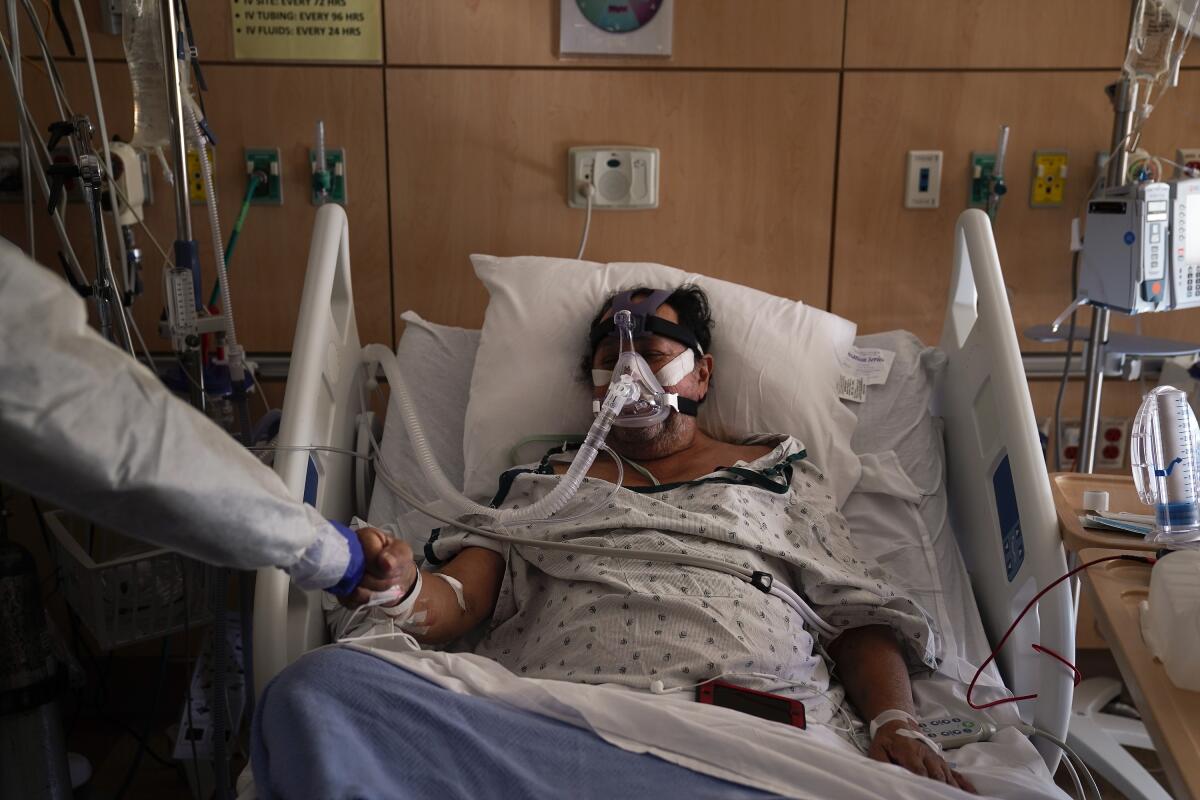
Conditions at Los Angeles County hospitals are worsening by the day, forcing officials to take increasingly desperate measures to prevent the healthcare system from crumbling under a crush of COVID-19 patients.
Methodist Hospital of Southern California has taken the grim step of convening a triage team that will âmake the difficult, but necessary decisions about allocating limited resourcesâ to critically ill patients âbased on the best medical information available,â officials said in a statement.
As of Wednesday, that team âhas yet to find the need to ration any care,â said Cliff Daniels, a senior vice president and chief strategy officer for the Arcadia-based hospital.
Though that is welcome news, it does not alleviate the precariousness of the situation â particularly if a long-feared surge of new patients, stemming from travel and gatherings over the winter holidays, comes to pass.
âWe are very fearful of what the next month is going to bring,â Daniels said.
At one vaccination clinic, a Times reporter watched as about 100 people were admitted without showing proof that they worked in healthcare.
In light of the worsening situation, the hospital notified the California Department of Public Health on Dec. 29 that it would implement crisis care guidelines.
Dr. Mark Ghaly, Californiaâs Health and Human Services secretary, said during a briefing Wednesday that he could not provide details on how many facilities have declared themselves to be at the crisis care level.
âI do not want to ignore the criticality of the situation â the fact that we have hospitals who really are dealing with crisis situation,â he said. âTheyâre making difficult decisions. They are exhausted. They are working hard to meet the needs of Californians, in particular many older Californians, who need that level of care.â
The continued deterioration in L.A. County comes as the coronavirus wreaks havoc throughout California. The state surpassed 2.5 million cumulative confirmed cases Wednesday, according to data compiled by The Times â meaning roughly 1 in every 16 Californians have now tested positive at some point during the pandemic.
Said L.A. County Public Health Director Barbara Ferrer: âThere really is no path forward to helping our hospitals unless we get the case numbers down. There just isnât.â
Methodist Hospital is far from unique when it comes to the crisis wrought by the pandemic. Some hospitals have reported being so crowded that theyâve had to place patients wherever they can find room, even in gift shops.
Although Methodist has not had to resort to that, the hospital is still caring for 229 patients â 116 of whom are COVID-positive. The facility can staff only 30 of its 40 licensed intensive care beds, and all of those are full.
Supplies of vital equipment, including ventilators, are tight, and there is limited availability of healthy hospital workers, the facility wrote in a public message to patients and their families.
âIf a patient becomes extremely ill and very unlikely to survive their illness, even with life-saving treatment, then certain resources currently limited in availability â such as ICU care or a ventilator â may be allocated to another patient who is more likely to survive,â the message states. âIf a ventilator or ICU care is not offered or is stopped, the patient has the right to ask their doctor for further detail regarding this decision, and will receive everything needed to ensure that they are free of pain or discomfort.â
Los Angeles County hit another distressing milestone Tuesday, surpassing 11,000 deaths since the beginning of the pandemic as officials warned conditions will only get worse in the coming weeks.
Despite the challenging circumstances, Daniels emphasized that patients in need of care will still find it at Methodist.
When a new patient arrives at the emergency room entrance, they are greeted by purple-gowned nurses who hand out paperwork, administer on-the-spot COVID-19 tests and offer temperature checks. There are stop signs, checkpoints and medical personnel guarding access to the ER.
To the right of the emergency room entrance sits a large white medical canopy. Coughs could be heard coming from inside the tent Wednesday while five masked patients sat outside in metal chairs.
One elderly woman was so disturbed by her own coughing fit that she moved away from the group. Another patient walked nervous laps.
Not too far away, a 15-foot-long, blue-and-white âArcadia Strongâ sign with a heart placed between the words could be seen on the ride eastward along Huntington Drive past Holly Avenue.
Fresno County hospitals scramble for oxygen machines to treat COVID patients at home, with few ICU beds available. Mortuaries work to maximize space.
In the face of the most recent surge, the newly appointed state public health officer and director of the California Department of Public Health, Dr. TĂłmas AragĂłn, issued a sobering order that forces the postponement of all but the most essential and lifesaving surgeries in wide swaths of Southern California and the San Joaquin Valley.
The situation is so bad in those regions that a plea was sent for additional staffing through Californiaâs mutual aid system. Some paramedics in the Bay Area are being sent to the southern half of the state. Two paramedics from the Mountain View Fire Department in Santa Clara County have been dispatched to hospitals in Bakersfield and L.A. County.
AragĂłn said the order to postpone surgeries is needed to help clear hospital space for the sickest COVID-19 patients.
âIf this increase of COVID-19 patients continues, hospitals may be unable to provide necessary emergency and critical care to Californians,â AragĂłn wrote. âIf hospitals lose the capacity to care for seriously ill COVID-19 cases, those highly infectious COVID-19 patients will be pushed into the general community, which will further increase community transmission.â
Many hospitals had already decided on their own to postpone surgeries. Last week, officials with L.A. Countyâs four publicly operated hospitals said the majority of nonessential surgeries had been postponed; Kaiser Permanente is also postponing non-urgent and elective surgeries and procedures at its facilities throughout California.
One 44-year-old patient had his kidney transplant surgery scheduled at Cedars-Sinai Medical Center for Jan. 15 postponed because no ICU beds were available.
The surgery order portends a time when some hospitals become so overwhelmed theyâre forced to declare to state and local public health departments they are operating under crisis standards of care.
When such a declaration is made to government authorities, nearby hospitals will be required to accept transfer patients under a new state order. Government officials are to âtake all measures to ensure balanced distribution of patients across the hospital system.â
Methodist Hospital has not formally declared to the county that it is under crisis standards of care, officials said Wednesday.
More than 2,200 people who work at hospitals in L.A. County tested positive for the coronavirus in December alone.
Though the statistics are staggering, officials have said there is light at the end of the COVID-19 tunnel with the arrival of vaccines.
Assuming supplies are available, Ferrer said the county hopes to begin vaccinating people 75 or older in February, as well as workers in education, child care, emergency services, food and agriculture.
The next priority group will include residents 65 and older and those who work in transportation and logistics; industrial, commercial, and residential and sheltering facilities; and services in critical manufacturing and congregate settings, including those sheltering the homeless and the incarcerated.
Ferrer said vaccines are âa ray of hope in these otherwise very dark days that weâre living through,â but stressed that, until the shots are widely available, residents need to continue taking steps to keep themselves and their loved ones from becoming infected.
âEach of us does have a choice to make,â she said.
More to Read
Sign up for Essential California
The most important California stories and recommendations in your inbox every morning.
You may occasionally receive promotional content from the Los Angeles Times.
